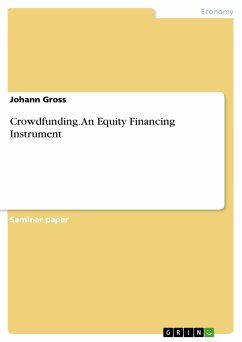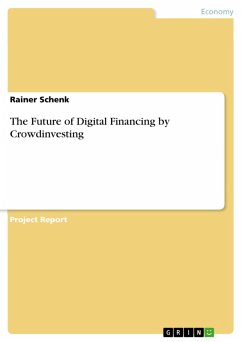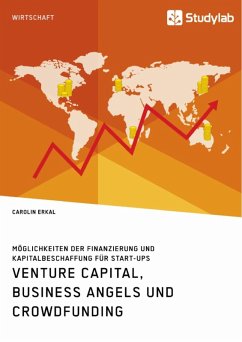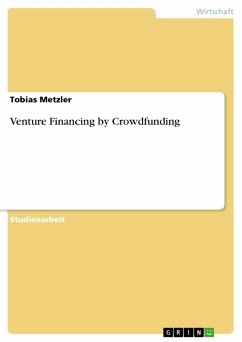
Crowdfunding. An Equity Financing Instrument (eBook, ePUB)
Versandkostenfrei!
Sofort per Download lieferbar
15,99 €
inkl. MwSt.
Weitere Ausgaben:

PAYBACK Punkte
0 °P sammeln!
Seminar paper from the year 2014 in the subject Business economics - Investment and Finance, grade: 1,3, University of applied sciences, Nürnberg (IOM), language: English, abstract: This work paper occupies with the issue of crowd funding as a financial instrument, by considering all types of crowd funding. The literature differs between a donation-based, a reward-based, a debt-based, and an equity-based type, whereat the law requires different claims. NPO's usually make use of donation-based crowd funding systems, whereas start-up companies try to use the equity-based or debt-based type to m...
Seminar paper from the year 2014 in the subject Business economics - Investment and Finance, grade: 1,3, University of applied sciences, Nürnberg (IOM), language: English, abstract: This work paper occupies with the issue of crowd funding as a financial instrument, by considering all types of crowd funding. The literature differs between a donation-based, a reward-based, a debt-based, and an equity-based type, whereat the law requires different claims. NPO's usually make use of donation-based crowd funding systems, whereas start-up companies try to use the equity-based or debt-based type to make an investment more attractive to the crowd. The JOBS-act enables start-up companies to collect equity or debt through crowd funding by limiting the requirements for these kind of companies to facilitate them an easier access to the financial market. Up to now, many online in-termediaries use a gap in law to provide equity-based crowd funding by building up so called angel groups through the registration of crowd funder. This club enables them investing in crowd funding without respecting the current legal requirements. Summing up, start-up companies are dependent on crowd funding as they will not get equity through the common way by asking banks or investment companies for loans. Crowd funding is an excellent opportunity and way to transform business ideas into real life business.
Dieser Download kann aus rechtlichen Gründen nur mit Rechnungsadresse in A, B, BG, CY, CZ, D, DK, EW, E, FIN, F, GR, HR, H, IRL, I, LT, L, LR, M, NL, PL, P, R, S, SLO, SK ausgeliefert werden.













